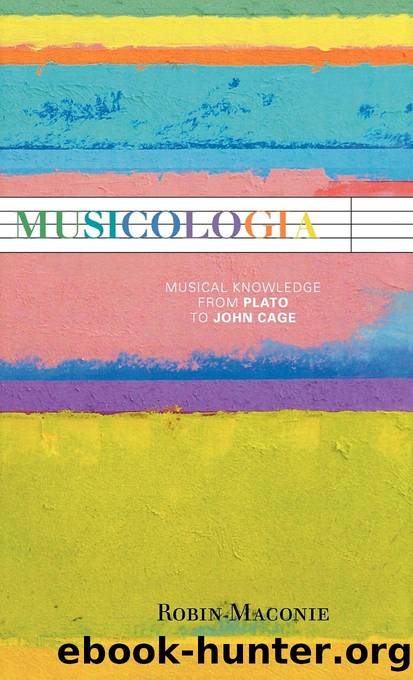Musicologia by Maconie Robin;

Author:Maconie, Robin;
Language: eng
Format: epub
Publisher: Scarecrow Press
Published: 2010-08-15T00:00:00+00:00
SIXTEEN
LECTURE ON NOTHING
Consider the following:
1. If you cannot read, you are not reading this.
2. If you can read, but not English, the meaning of this statement is that you cannot read it.
3. If you can read English, this statement is a tautology.
4. The significance of this statement is the significance of this statement.1
The presumptions a reader brings to bear on any statement and dialogue are of interest because the existence of language implies a precondition that language is possible, so that for communication to take place presupposes a sharing of language as well as of information (or rather, that every act of communication is simultaneously a rite of verification of the language itself and its ability to convey information at all). For information to be shared, it has to be understoodâat least, up to a point. Imitation is not only the sincerest form of flattery, it is also a fundamental indicator of understanding. The issue here is the limit of understanding implied by direct imitation. Whether the purpose of communication is to enable the recipient either to act independently, or merely to obey: whether information is understood with reference to understanding the language, or the information content of language. For example, the statement âI am in painâ may appear incomprehensible to a person who does not speak English, meaningless or incomplete to a philosopher for whom pain is inexpressible, hence nonexistent, or a genuine cry for help. Understanding the process of information exchange is a fundamental consideration of artificial intelligence, and also of philosophy. How we understand the operation of dialogue in speech has a bearing on music as well. The case against music, and modern music in particular, is founded on a misconception that information can only be shared by means of a language, that language communicates spontaneously, and that because music, especially modern music, does not communicate anything specific, it is not a language. The analogous case against poetry is that it does not qualify as language use for the purposes of communication science or linguistics because its use of language is invincibly subjective and its information content is either trivial, or negligible, or at best unreliable. Arguments from communication science, as from incomprehension, further imply that statements in language are morally bound to convey useful information, making philosophers to that extent obligated to avoid bringing language itself into disrepute by raising doubts over the reliability of terms or the efficacy of language as a medium of communication. The assumption that to deal with language is to deal with the whole of communication is only one of the more startling misconceptions of modern day linguistics and linguistic philosophy.
In 1950, when information science and artificial (machine) intelligence were exciting and new subjects of inquiry, a British biologist declared that âThe function of language is to tell each other as much as possible that is useful, so that we may help each other to live,â adding that pleasure and pain, which are indefinable, do not therefore âexist.â2 Such a statement
Download
This site does not store any files on its server. We only index and link to content provided by other sites. Please contact the content providers to delete copyright contents if any and email us, we'll remove relevant links or contents immediately.
Aircraft Design of WWII: A Sketchbook by Lockheed Aircraft Corporation(32275)
The Great Music City by Andrea Baker(31908)
Call Me by Your Name by André Aciman(20481)
The Secret History by Donna Tartt(19017)
The Art of Boudoir Photography: How to Create Stunning Photographs of Women by Christa Meola(18608)
Shoot Sexy by Ryan Armbrust(17717)
Plagued by Fire by Paul Hendrickson(17398)
Portrait Mastery in Black & White: Learn the Signature Style of a Legendary Photographer by Tim Kelly(16996)
Adobe Camera Raw For Digital Photographers Only by Rob Sheppard(16965)
Photographically Speaking: A Deeper Look at Creating Stronger Images (Eva Spring's Library) by David duChemin(16674)
Ready Player One by Cline Ernest(14630)
Pimp by Iceberg Slim(14476)
Bombshells: Glamour Girls of a Lifetime by Sullivan Steve(14046)
The Goal (Off-Campus #4) by Elle Kennedy(13646)
Art Nude Photography Explained: How to Photograph and Understand Great Art Nude Images by Simon Walden(13028)
Kathy Andrews Collection by Kathy Andrews(11801)
The Priory of the Orange Tree by Samantha Shannon(9055)
The remains of the day by Kazuo Ishiguro(8962)
Thirteen Reasons Why by Jay Asher(8880)
